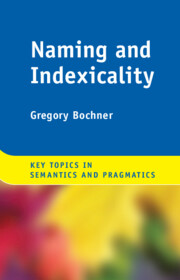Book contents
- Naming and Indexicality
- Key Topics in Semantics and Pragmatics
- Naming and Indexicality
- Copyright page
- Dedication
- Contents
- Acknowledgements
- Introduction
- 1 Descriptivism
- 2 The Referentialist Revolution
- 3 Three Puzzles Arising from the Rigidity Thesis
- 4 Varieties of Descriptivist Responses
- 5 Two-Dimensionalism
- Conclusion
- Glossary
- Works Cited
- Index
3 - Three Puzzles Arising from the Rigidity Thesis
Published online by Cambridge University Press: 02 December 2021
- Naming and Indexicality
- Key Topics in Semantics and Pragmatics
- Naming and Indexicality
- Copyright page
- Dedication
- Contents
- Acknowledgements
- Introduction
- 1 Descriptivism
- 2 The Referentialist Revolution
- 3 Three Puzzles Arising from the Rigidity Thesis
- 4 Varieties of Descriptivist Responses
- 5 Two-Dimensionalism
- Conclusion
- Glossary
- Works Cited
- Index
Summary
This chapter highlights (following Paul Boghossian) the implicit role that an epistemic thesis of Transparency has played since Frege in contemporary theories of meaning; discusses the role of that thesis in pragmatic motivations for the modal analysis of content, and reformulates the three main epistemic puzzles that any theory of singular expressions must confront. Emphasis is placed on the connections between opacity/transparency (epistemic notions) and intensions (modal notions).
Keywords
Information
- Type
- Chapter
- Information
- Naming and Indexicality , pp. 65 - 88Publisher: Cambridge University PressPrint publication year: 2021
